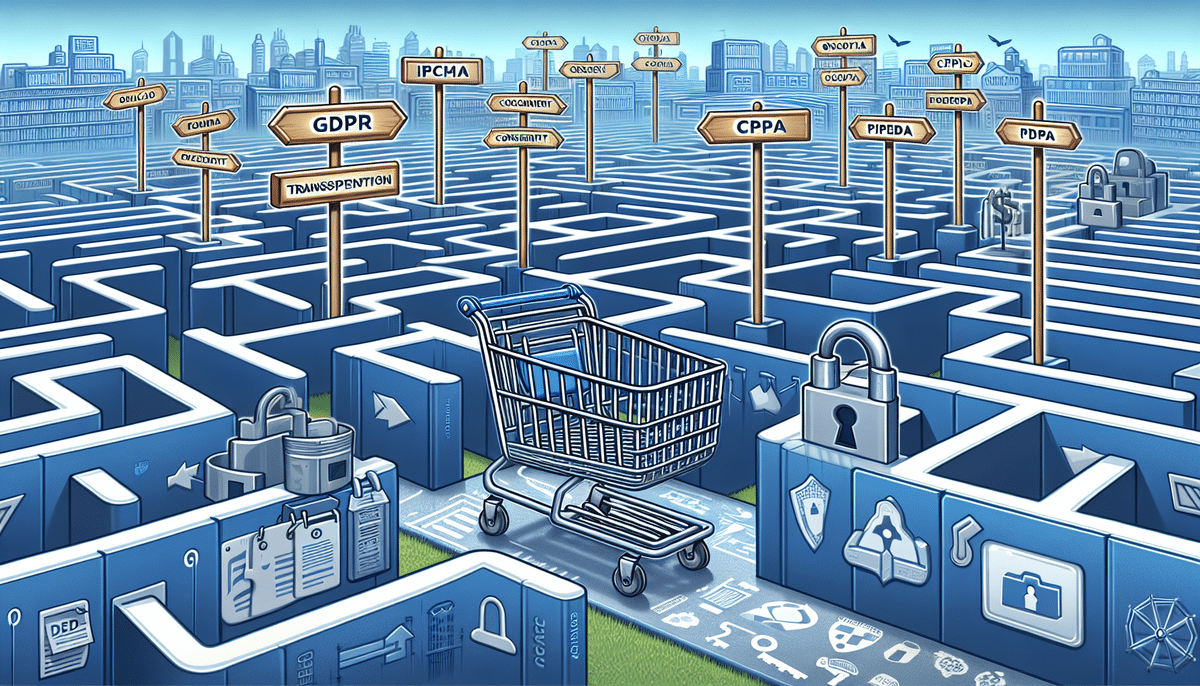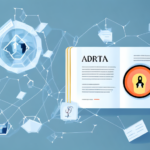Navigating E-Commerce Challenges: Compliance with Privacy Regulations (e.g., GDPR, CCPA)
E-commerce has revolutionized the way we shop and conduct business, offering unprecedented convenience and accessibility. However, with the surge in online transactions, there are increased privacy concerns regarding the protection of consumers' personal data. In response, several robust privacy regulations have been implemented globally to safeguard consumer information and mandate compliance from e-commerce businesses. This article delves into the major privacy regulations affecting e-commerce and provides strategies for businesses to ensure compliance.
Major Privacy Regulations in E-Commerce
The landscape of privacy regulations is continuously evolving, with the General Data Protection Regulation (GDPR) and the California Consumer Privacy Act (CCPA) standing out as the most influential frameworks impacting e-commerce businesses.
General Data Protection Regulation (GDPR)
The GDPR is a comprehensive data protection law enacted by the European Union to protect the personal data of its citizens. Implemented in May 2018, GDPR mandates that businesses obtain explicit consent from customers before collecting or processing their personal data. Key provisions include:
- Right to access: Consumers can request access to their personal data held by businesses.
- Right to be forgotten: Consumers can demand the deletion of their personal data.
- Data portability: Consumers have the right to transfer their data between service providers.
Non-compliance with GDPR can result in fines up to €20 million or 4% of the company's global annual revenue, whichever is higher. For more details, refer to the official GDPR text.
California Consumer Privacy Act (CCPA)
The CCPA, effective since January 2020, provides California residents with enhanced privacy rights and control over their personal information. Key aspects include:
- Right to know: Consumers can request details about the personal information businesses collect about them.
- Right to delete: Consumers can request the deletion of their personal data.
- Right to opt-out: Consumers can opt-out of the sale of their personal information.
Violations of the CCPA can lead to fines of up to $7,500 per intentional violation and $2,500 for unintentional breaches. More information is available on the California Attorney General's website.
Other Relevant Privacy Regulations
In addition to GDPR and CCPA, e-commerce businesses should consider the following international privacy laws:
- Personal Information Protection and Electronic Documents Act (PIPEDA) in Canada
- Privacy Act in Australia
- Personal Data Protection Act (PDPA) in Singapore
These regulations share similarities with GDPR and CCPA, emphasizing consent, transparency, and data protection. Understanding and adhering to these laws is crucial for global e-commerce operations. For comprehensive details, refer to the respective official government portals:
- PIPEDA - Government of Canada
- Privacy Act - Australian Government
- PDPA - Personal Data Protection Commission Singapore
Compliance with these regulations is essential not only for legal adherence but also for building consumer trust and maintaining a competitive edge in the market.
Consequences of Non-Compliance with Privacy Regulations
Non-compliance with privacy regulations such as GDPR and CCPA can have severe repercussions for e-commerce businesses:
- Financial Penalties: GDPR imposes fines up to €20 million or 4% of global annual revenue. CCPA fines reach up to $7,500 per violation.
- Reputational Damage: Breaches can erode consumer trust, leading to decreased sales and customer loyalty.
- Legal Action: Consumers may initiate lawsuits, resulting in costly legal battles.
- Operational Disruptions: Investigation processes and remediation efforts can divert resources from core business activities.
For instance, in 2021, British Airways was fined £20 million under GDPR for data breaches affecting 400,000 customers. Similarly, in 2020, Sephora faced a $1.2 million fine under CCPA for failing to protect customer data.
These examples underscore the importance of prioritizing data protection and regulatory compliance in e-commerce strategies.
Ensuring GDPR and CCPA Compliance in Your E-Commerce Business
Achieving compliance with GDPR and CCPA involves implementing comprehensive strategies and best practices:
- Obtain Explicit Consent: Ensure that customer consent is clear, specific, and obtained before data collection or processing.
- Transparency: Clearly communicate how customer data will be used, stored, and shared.
- Data Access and Control: Provide customers with the ability to access, correct, or delete their personal data.
- Vendor Compliance: Ensure that third-party vendors are also compliant with GDPR and CCPA by conducting regular audits.
- Privacy Impact Assessments: Regularly assess data processing activities to identify and mitigate privacy risks.
- Employee Training: Educate employees on data protection principles and regulatory requirements.
Implementing these strategies not only ensures compliance but also fosters trust and transparency with customers, enhancing the overall reputation of your e-commerce business.
Best Practices for Handling Customer Data in E-Commerce
Adhering to best practices in data handling is crucial for protecting customer information and maintaining compliance:
- Data Encryption: Use robust encryption protocols to safeguard data both in transit and at rest.
- Access Controls: Restrict access to sensitive data to authorized personnel only.
- Regular Data Audits: Conduct periodic reviews to identify and eliminate unnecessary or outdated data.
- Secure Authentication: Implement strong password policies and multi-factor authentication to protect user accounts.
- Malware Protection: Utilize firewalls, antivirus software, and intrusion detection systems to defend against cyber threats.
Additionally, maintaining a clear and concise privacy policy that outlines data collection, usage, and sharing practices is essential for building customer trust and ensuring transparency.
Creating a Robust Privacy Policy for Your E-Commerce Business
A well-crafted privacy policy is fundamental for GDPR and CCPA compliance. It should comprehensively detail how your business handles customer data, covering the following elements:
- Data Collection: Specify the types of personal data collected.
- Data Usage: Explain how the collected data will be used.
- Data Sharing: Identify third parties with whom data is shared.
- Data Security: Outline the security measures in place to protect data.
- Customer Rights: Detail how customers can access, correct, or delete their data.
- Consent Mechanism: Explain how and when consent is obtained.
Regularly updating the privacy policy to reflect changes in business practices or legal requirements ensures ongoing compliance. Making the policy easily accessible on your website, such as in the footer, enhances transparency and trust.
Impact of GDPR and CCPA on Cross-Border E-Commerce Transactions
GDPR and CCPA have a profound impact on cross-border e-commerce operations. These regulations apply to any business that processes the data of individuals within their jurisdictions, regardless of the business's location. This global reach necessitates that e-commerce businesses adopt a unified approach to data protection and compliance.
Key challenges include:
- Regulatory Complexity: Navigating the diverse requirements of different privacy laws can be complex and resource-intensive.
- Data Localization: Some regulations may require data to be stored within specific geographic boundaries.
- Consent Management: Obtaining and managing consent across multiple regions with varying standards.
For example, an e-commerce business based outside the EU but serving EU customers must comply with GDPR, necessitating robust data protection measures and possibly establishing a local data processing presence.
To effectively manage cross-border compliance, businesses should adopt international standards such as the ISO/IEC 27001 for information security management and consider appointing Data Protection Officers (DPOs) to oversee compliance efforts.
Handling Customer Requests for Data Access or Deletion under GDPR and CCPA
Under GDPR and CCPA, customers have the right to access, correct, and delete their personal data. E-commerce businesses must establish efficient processes to handle these requests:
- Verification: Implement robust identity verification to ensure that data requests are legitimate.
- Data Retrieval: Develop systems to quickly locate and retrieve customer data upon request.
- Deletion Protocols: Ensure complete and irreversible deletion of data when requested.
- Response Time: Adhere to regulatory timelines for responding to data access or deletion requests (e.g., within 30 days under GDPR).
- Record-Keeping: Maintain logs of all data requests and actions taken to demonstrate compliance.
Implementing automated data management systems can streamline these processes, ensuring timely and accurate responses. Additionally, providing clear instructions and support channels for customers to submit their requests enhances user experience and trust.
Role of Technology in Ensuring Privacy Compliance in E-Commerce
Leveraging technology is essential for maintaining privacy compliance efficiently and effectively:
- Data Mapping Tools: Utilize tools to visualize data flows, identify storage locations, and monitor data processing activities.
- Automated Compliance Software: Implement software solutions that manage consent, track regulatory changes, and ensure adherence to compliance requirements.
- Secure Data Storage: Employ advanced security measures such as encryption, tokenization, and secure cloud storage to protect customer data.
- Incident Response Systems: Establish automated systems to detect, report, and respond to data breaches swiftly.
By integrating these technologies, e-commerce businesses can enhance their data protection capabilities, reduce the risk of non-compliance, and ensure the seamless management of customer data.
Training Employees on Privacy Laws and Regulations in E-Commerce
Employee awareness and training are critical components of privacy compliance:
- Data Protection Principles: Educate employees on the fundamental principles of data protection, including confidentiality, integrity, and availability.
- Regulatory Requirements: Provide comprehensive training on the specific requirements of GDPR, CCPA, and other relevant privacy laws.
- Handling Data Requests: Train staff on procedures for managing customer data access and deletion requests.
- Security Best Practices: Encourage best practices for data security, such as using strong passwords and recognizing phishing attempts.
- Regular Refresher Courses: Conduct ongoing training sessions to keep employees updated on changes in privacy regulations and emerging threats.
Investing in continuous employee education fosters a culture of compliance and ensures that all team members are equipped to handle data responsibly.
Mitigating the Risks of Data Breaches in E-Commerce
Data breaches pose significant threats to e-commerce businesses, leading to financial loss, reputational damage, and legal consequences. To mitigate these risks, businesses should implement the following measures:
- Data Encryption: Encrypt sensitive data to protect it from unauthorized access.
- Secure Authentication: Implement multi-factor authentication (MFA) to enhance login security.
- Regular Security Audits: Conduct frequent security assessments to identify and address vulnerabilities.
- Incident Response Plan: Develop and maintain a comprehensive plan to address data breaches promptly and effectively.
- Employee Training: Educate employees on recognizing and preventing potential security threats.
- Advanced Threat Protection: Utilize firewalls, antivirus software, and intrusion detection systems to defend against cyberattacks.
By adopting these proactive measures, e-commerce businesses can significantly reduce the likelihood of data breaches and minimize their impact if they occur.
Balancing User Experience with Privacy Requirements in Your E-Commerce Website
Maintaining a seamless user experience while adhering to privacy regulations is essential for e-commerce success. Striking this balance involves:
- Transparent Communication: Clearly inform users about data collection and usage through concise privacy notices.
- User-Friendly Consent Forms: Design consent mechanisms that are easy to understand and interact with, avoiding intrusive pop-ups.
- Minimal Data Collection: Collect only the data necessary for transaction processing and service improvement to reduce privacy risks.
- Personalization Without Intrusion: Offer personalized experiences without compromising user privacy by anonymizing data where possible.
- Accessible Privacy Settings: Provide intuitive interfaces for users to manage their privacy preferences and data permissions.
By integrating these practices, e-commerce businesses can enhance user satisfaction while ensuring compliance with privacy regulations.
Effectively Communicating Your Privacy Practices to Customers
Effective communication of privacy practices is vital for building trust and ensuring compliance:
- Comprehensive Privacy Policy: Develop a detailed privacy policy that is easy to understand and readily accessible on your website.
- Clear Consent Notices: Use clear and concise language in consent notices to inform users about data collection and processing activities.
- Real-Time Notifications: Implement real-time notifications, such as pop-ups or banners, to inform users when data collection occurs.
- Dedicated Support Channels: Provide accessible channels, such as live chat or email support, for customers to address privacy-related inquiries and concerns.
- Regular Updates: Keep customers informed about changes to privacy practices or policies through newsletters or website updates.
Transparent and consistent communication reinforces your commitment to data protection and enhances customer confidence in your e-commerce platform.
Choosing the Right Third-Party Vendors Compliant with GDPR and CCPA
Third-party vendors play a crucial role in e-commerce operations, handling services such as payment processing, analytics, and email marketing. Selecting vendors that comply with GDPR and CCPA is essential for maintaining overall data protection:
- Vendor Due Diligence: Conduct thorough assessments to ensure that vendors have robust data protection measures and comply with relevant regulations.
- Review Privacy Policies: Examine vendor privacy policies and data handling practices to ensure alignment with your compliance requirements.
- Compliance Certifications: Prefer vendors that hold recognized compliance certifications, such as ISO/IEC 27001 or SOC 2.
- Contractual Agreements: Establish clear contractual agreements that mandate adherence to GDPR, CCPA, and other applicable privacy laws.
- Regular Audits: Periodically audit vendor practices to ensure ongoing compliance and address any emerging risks.
By carefully selecting and managing third-party vendors, e-commerce businesses can enhance their data protection strategies and mitigate compliance risks.
Future of Privacy Regulations and Their Impact on the E-Commerce Industry
The landscape of privacy regulations is expected to become increasingly stringent as the volume of personal data continues to grow. Future trends in privacy regulations and their implications for e-commerce include:
- Expansion of Data Protection Laws: More countries are expected to implement comprehensive data protection laws similar to GDPR and CCPA.
- Enhanced Enforcement: Regulatory bodies may adopt more rigorous enforcement mechanisms and higher penalties for non-compliance.
- Focus on Data Minimization: Regulations may emphasize the importance of collecting only essential data to reduce privacy risks.
- Increased Consumer Rights: Future laws might grant consumers greater control over their data, including advanced consent management and data portability.
- Technological Integration: Privacy regulations may integrate with emerging technologies such as artificial intelligence and blockchain, necessitating new compliance strategies.
To stay ahead, e-commerce businesses should proactively monitor regulatory developments, invest in scalable compliance solutions, and foster a culture of data protection and privacy.
In conclusion, compliance with GDPR and CCPA is paramount for e-commerce businesses aiming to protect customer data, avoid hefty fines, and maintain a trustworthy brand image. By implementing robust data handling practices, creating comprehensive privacy policies, leveraging technology, and ensuring continuous employee training, businesses can navigate the complex landscape of privacy regulations effectively. Embracing these measures not only ensures legal compliance but also fosters customer trust and loyalty, driving long-term success in the competitive e-commerce market.




















